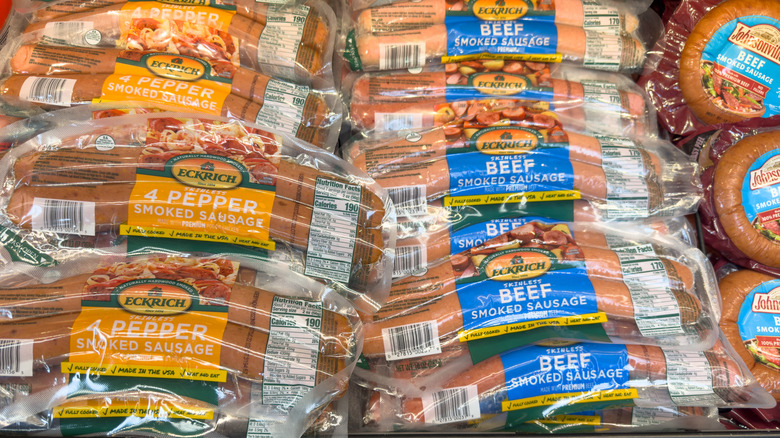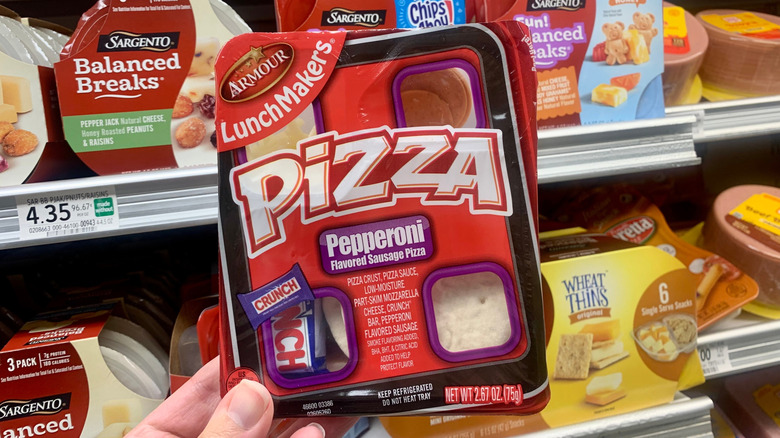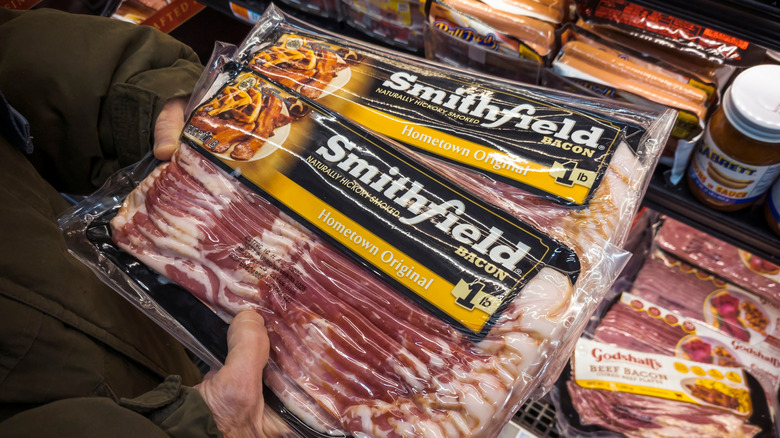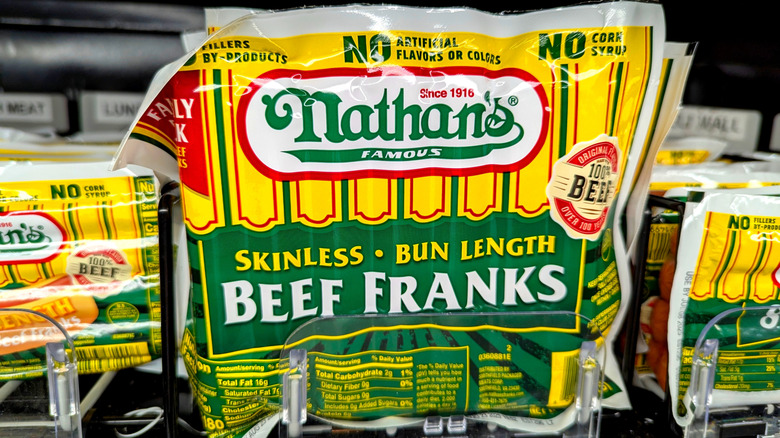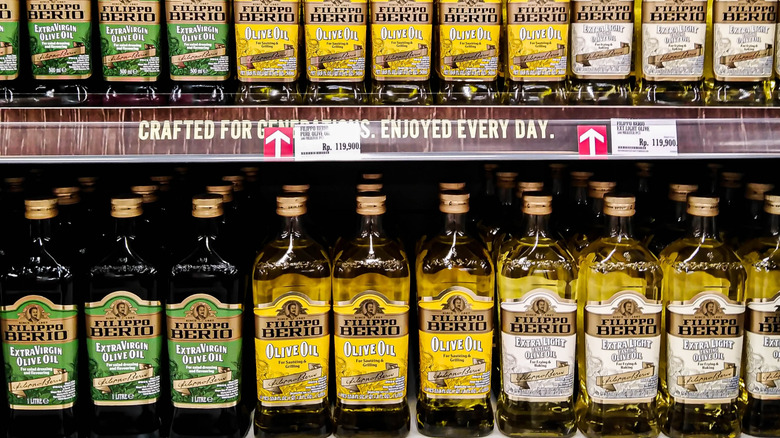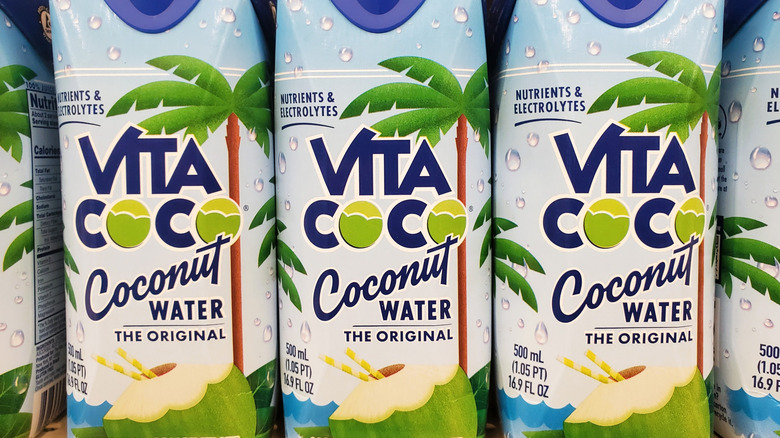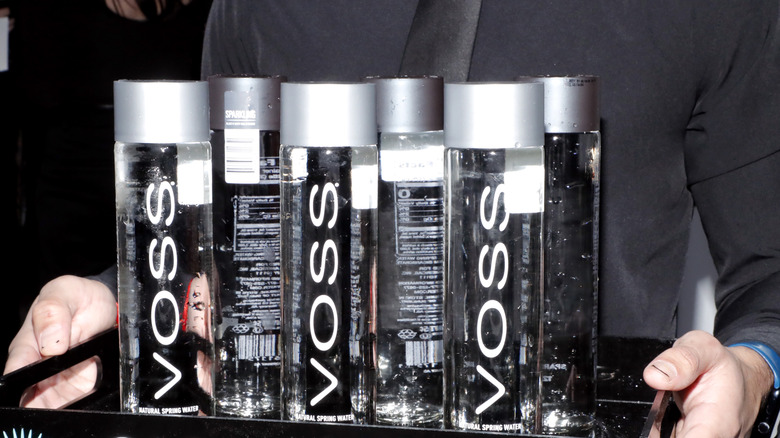These Iconic Food Brands Are Owned By Chinese Companies
The United States' relationship with China is complicated and seemingly ever evolving. If you're not the political type (or just not one to pay attention to international relations), you might just ignore these facts and go about your business. However, could you be impacted by China's actions more than you really think, even on a minute, mundane, everyday level ... like when you grocery shop? Yes, potential food tariffs could negatively impact your grocery budget if prices increase, but beyond that, some feel that China-owned brands in the grocery store could pose a threat to national security, as well to the country's food and energy supply.
There are a range of brands that are owned by Chinese companies either completely or to a significant degree. China owns brands like GE, the AMC movie theater chain, and Motorola Mobility, as well as a handful of food brands that you may have in your fridge or pantry right this second — and they're so ingrained into U.S. culture that you'd never even guess it.
Eckrich
Eckrich actually has German roots, not American nor Chinese roots. The original founder, Peter Eckrich, immigrated to the U.S. in the 1800s and set up a meat market in Indiana. The brand grew its footprint throughout the country over the late 1800s and early 1900s. Eventually, Beatrice Foods acquired Eckrich (Beatrice Foods owned a wealth of famous brands over its lifetime, from Milk Duds to Dannon and even Airstream). When Beatrice Foods collapsed, Eckrich went to Conagra, the Chicago-based owner of brands such as Marie Callender's and Slim Jim. In 2006, Conagra sold Eckrich to Smithfield Foods — and, finally, in 2013, a Chinese firm acquired Smithfield for almost $5 billion.
The knowledge that Eckrich sausage is owned by a Chinese firm has angered some. In 2024, an Ohio meat shop posted to Facebook that it would no longer sell Eckrich products, as the company is wholly owned by WH Group Limited which is, according to the poster, financially backed by the Chinese government (the state-owned Bank of China Limited supported the acquisition with a large loan). The brand switched to offering Johnsonville products instead. Johnsonville is privately and family owned.
Armour
Armour makes a range of meat products, from pepperoni and summer sausage to canned meats and Lunchables lookalikes, and even deli meats and hot dogs. Founded in 1867 in Chicago, the originally American-owned company has changed hands multiple times over its history. At one point, it was owned by Greyhound (yes, that Greyhound, with the buses). Then it went to Pinnacle, which once owned brands like Duncan Hines and Hungry Man. Finally, just like Eckrich, Armour went to Conagra when Conagra acquired Pinnacle. As you can guess, then, when Conagra sold Eckrich to Smithfield Foods, it also sold Armour, and Smithfield Foods later was acquired by the Hong Kong-headquartered WH Group.
Some officials have spoken out with concerns regarding WH Group's ownership of brands like Armour and Eckrich, claiming that the Chinese Communist Party-backed group is buying up American land at rapid rates and establishing factory farming operations (although Smithfield Foods claims it's still an American company). As for brands that produce a lot of pork, these massive factory farming operations have been called, rather depressingly, "hog hotels."
Smithfield
If you've gotten this far, you know that Smithfield Foods is Chinese-owned — but how did the company (and all its brands) end up in Chinese hands? Beneath Smithfield Foods is the OG Smithfield brand. It started as Smithfield Packing Company, which was founded in Virginia in 1936. Over the decades, Smithfield acquired brand after brand until, in 2000, it was the world's largest pork producer. The acquisitions continued, with Smithfield taking Armour and Eckrich in 2006.
Finally, in 2013, Shuanghui International Holdings Limited — now known as WH Group — fully acquired Smithfield and all its associated brands. The company was already China's largest pork producer, and the $4.7 billion price tag for Smithfield came with Smithfield's supplies and technical experience, as well as extra pork to feed a growing market in China. Since then, WH Group has moved on to attempting to scoop up other beef and poultry producers across the U.S. and Europe. As of 2023, more than 80% of the 380,000 acres of Chinese-owned U.S. soil belonged to Smithfield Foods and the billionaire businessman Sun Guangxin.
Nathan's Famous
When you think of all the hot dog brands in the grocery store, if you had to pick the most American option, which would you choose? Some might opt for seemingly premium Oscar Mayer wieners, but a good portion of people would probably pick Nathan's Famous. With its Coney Island legacy and ubiquitous presence at Fourth of July hot dog eating festivities, Nathan's Famous just feels all-American — but it's not.
The Nathan's Famous restaurant franchise was purchased in 1987 from its founders, the Handwerker family, by Equicor Group, which still owned the company as of 2024. Smithfield Foods, meanwhile, holds the license to produce the Nathan's Famous hot dogs that you see in the grocery store — and since Smithfield Foods is Chinese-owned, that means the Nathan's Famous hot dogs you're buying for your summer cookout are a Chinese-produced product.
In 2023, it was theorized that Smithfield Foods could face government backlash for its Chinese ownership, particularly after another Chinese company (the producer of the unfairly slandered MSG, in fact) decided to build a facility near a U.S. Air Force base, prompting fears of espionage under the guise of mere manufacturing. However, thus far, Smithfield's biggest controversies have included child labor allegations leading to a $2 million settlement, and tariffs impacting Smithfield's shipping of pork back to its (new) home country.
Filippo Berio
You might not immediately recognize the name, but you probably recognize this product on sight. Olive oil brand Filippo Berio was founded in 1867 and can be found among the olive oil selections at just about any grocery store. Along with the Sagra olive oil brand, Filippo Berio is part of the Salov Group and, while the Salov Group is technically based in Italy, it's still one of the leading olive oil brands in the U.S.
However, when you're picking up a bottle of Filippo Berio, you're not really buying Italian-owned olive oil. You're buying Chinese-owned olive oil – China's Bright Food Group majority owns the Salov Group as of 2014. Bright Food purchased the group from its private, family owners. At the time, it was indicated that the company was buying Salov Group in an effort to acquire more Italian brands overall. In 2016, Salov Group's CEO additionally noted expansive potential for growing olive oil demand in China, and the country's importation of Italian olive oil grew by double digits in the first half of that year.
Vita Coco
Vita Coco was the U.S.' very first natural coconut water brand. Since its release more than two decades ago, it — and its market — has grown substantially, and is expected to continue to do so. The Vita Coco Company is majority owned by All Market Brands, launched by the same individuals who first launched Vita Coco. All Market Brands also owns Runa and Ever & Ever, two beverages that haven't received nearly the same amount of attention as Vita Coco.
However, while Vita Coco may still be mostly owned by the same people who started the coconut water craze, a Chinese company owns 25% of the brand. The sale took place in 2014, with the Reignwood Group purchasing the 25% stake for $165 million. At the time, Reignwood Group also owned Red Bull China, which accounted for half of Red Bull's international business. The sale allowed Vita Coco to come into the Chinese market. After this sale, PepsiCo did attempt to purchase Vita Coco wholly in 2017, but nothing materialized from those well-publicized talks.
Voss
Voss's roots are a little murky. The company is based in New York City, and its water is bottled by an American company, while the water itself does come from Norway. In addition to Norway and the U.S., though, China is also involved in this recognizable water brand's business. In 2016, the Reignwood Group — the same Chinese investment company that purchased a portion of Vita Coco in 2014 — purchased a majority share of Voss for $105 million.
Since then, not much has been reported on this acquisition. Voss continues to hold a reputation as one of the more "luxury" water brands, but it's not quite the trendy marker of sophisticated hydration that it once was. The company has seen significant financial losses since the takeover, even though it continues to grow throughout the Chinese market. Otherwise, the brand has pretty much kept its name out of the news, both good and bad — except for one interesting instance in 2018, when Alaska ranked Voss water as its top, most hated food.

